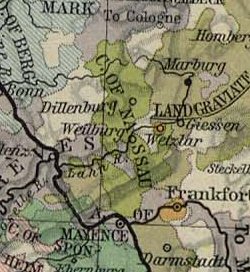County of Nassau
| (Princely) County of Nassau Principalities of Nassau |
||||||||||
| (Gefürsteter) Grafschaft Nassau Fürstentümer Nassau |
||||||||||
| State of the Holy Roman Empire | ||||||||||
|
||||||||||
|
County of Nassau in 1547
|
||||||||||
| Capital | Nassau | |||||||||
| Languages | German (Rhine Franconian dialects, Moselle Franconian dialects) | |||||||||
| Government | Principality | |||||||||
| Historical era | Middle Ages | |||||||||
| • | City founded | 915 | ||||||||
| • | Robert I claims title of count | 1125 | ||||||||
| • | Comital title acknowledged | 1159 | ||||||||
| • | Partitioned multiple times | 1255–1806 | ||||||||
| • | Remaining parts unified to form duchy |
1806 | ||||||||
|
||||||||||
| Today part of |
|
|||||||||
The County of Nassau was a German state within the Holy Roman Empire and later part of the German Confederation. Its ruling dynasty, the male line of which is now extinct, was the House of Nassau.
Nassau, originally a county, developed on the lower Lahn river in what is known today as Rhineland-Palatinate. The town of Nassau was founded in 915.Dudo-Henry, Count of Laurenburg held Nassau as a fiefdom as granted by the Bishopric of Worms. His son, Robert, built the Nassau Castle there around 1125, declaring himself "Count of Nassau". This title was not officially acknowledged by the Bishop of Worms until 1159 under the rule of Robert's son, Walram. By 1159, the County of Nassau effectively claimed rights of taxation, toll collection, and justice, at which point it can be considered to become a state.
The Nassauers held the territory between the Taunus and the Westerwald at the lower and middle Lahn. By 1128, they acquired the bailiwick of the Bishopric of Worms, which had numerous rights in the area, and thus created a link between their heritage at the lower Lahn and their possessions near Siegen. In the middle of the 12th century, this relationship was strengthened by the acquisition of parts of the Hesse-Thüringen feudal kingdom, namely the Herborner Mark, the Kalenberger Zent and the Court of Heimau (Löhnberg). Closely linked to this was the "Lordship of Westerwald", also in Nassau's possession at the time. At the end of the 12th century, the House acquired the Reichshof Wiesbaden, an important base in the southwest.
...
Wikipedia


